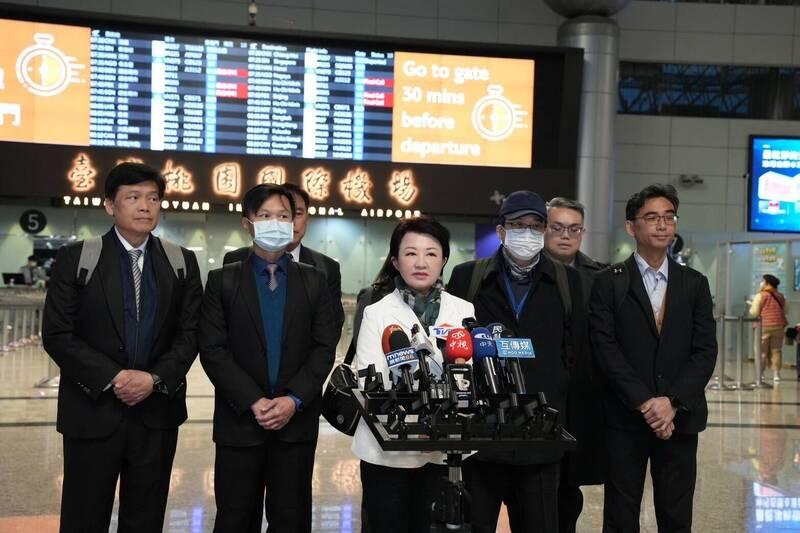Taichung Mayor Lu Shiow-yen (盧秀燕) departed for Japan today to focus on city diplomacy and study Japan's domed stadiums to help accelerate the construction of Taichung's own large-scale multi-purpose dome.
Speaking to reporters before her departure, Lu emphasized Japan's significance as a key partner for Taiwan and Taichung.
The six-day trip marks her first visit to Japan since taking office six years ago.

Photo courtesy of the Taichung City Government
It is to include stops in Sapporo, Nagoya and Tokyo, with four days dedicated to official engagements, Lu said.
Another key focus is to learn from Japan's domed stadiums, Lu said, adding that her delegation would visit four of them and study their different functions, operational models and financial strategies.
Construction of Taichung Arena is currently underway, while the city plans to build yet another domed stadium capable of hosting baseball games and large-scale international performances, she said.
Asked whether the trip was meant to pave the way for a nomination in the 2028 presidential election, the Chinese Nationalist Party (KMT) mayor urged the public not to make too many associations.
City-to-city diplomacy is a key task for local leaders, she said, adding that she is one of the few leaders of the nation’s biggest cities who has not yet visited Japan.
Additional reporting by Su Meng-chuan

Taiwan is stepping up plans to create self-sufficient supply chains for combat drones and increase foreign orders from the US to counter China’s numerical superiority, a defense official said on Saturday. Commenting on condition of anonymity, the official said the nation’s armed forces are in agreement with US Admiral Samuel Paparo’s assessment that Taiwan’s military must be prepared to turn the nation’s waters into a “hellscape” for the Chinese People’s Liberation Army (PLA). Paparo, the commander of the US Indo-Pacific Command, reiterated the concept during a Congressional hearing in Washington on Wednesday. He first coined the term in a security conference last

Prosecutors today declined to say who was questioned regarding alleged forgery on petitions to recall Democratic Progressive Party (DPP) legislators, after Chinese-language media earlier reported that members of the Chinese Nationalist Party (KMT) Youth League were brought in for questioning. The Ministry of Justice Investigation Bureau confirmed that two people had been questioned, but did not disclose any further information about the ongoing investigation. KMT Youth League members Lee Hsiao-liang (李孝亮) and Liu Szu-yin (劉思吟) — who are leading the effort to recall DPP caucus chief executive Rosalia Wu (吳思瑤) and Legislator Wu Pei-yi (吳沛憶) — both posted on Facebook saying: “I

The Ministry of Economic Affairs has fined Taobao NT$1.2 million (US$36,912) for advertisements that exceed its approved business scope, requiring the Chinese e-commerce platform to make corrections in the first half of this year or its license may be revoked. Lawmakers have called for stricter enforcement of Chinese e-commerce platforms and measures to prevent China from laundering its goods through Taiwan in response to US President Donald Trump’s heavy tariffs on China. The Legislative Yuan’s Finance Committee met today to discuss policies to prevent China from dumping goods in Taiwan, inviting government agencies to report. Democratic Progressive Party Legislator Kuo Kuo-wen (郭國文) said

The Ministry of Economic Affairs has fined Taobao NT$1.2 million (US$36,900) for advertisements that exceeded its approved business scope and ordered the Chinese e-commerce platform to make corrections in the first half of this year or its license would be revoked. Lawmakers have called for stricter supervision of Chinese e-commerce platforms and more stringent measures to prevent China from laundering its goods through Taiwan as US President Donald Trump’s administration cracks down on origin laundering. The legislature’s Finance Committee yesterday met to discuss policies to prevent China from dumping goods in Taiwan, inviting government agencies to report on the matter. Democratic Progressive Party